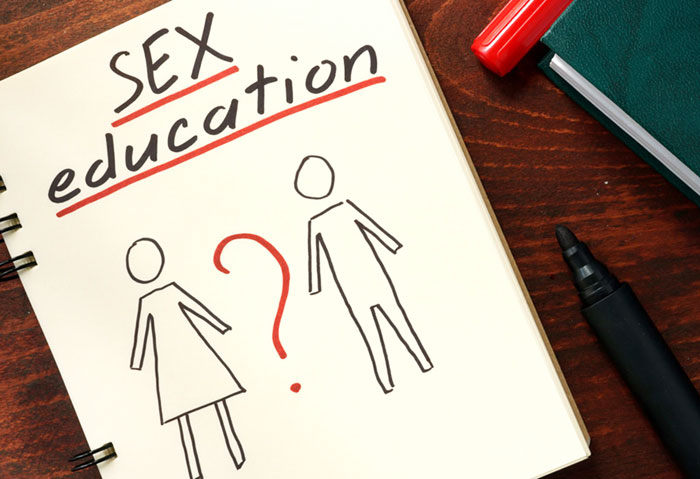
This is a topic very close to my heart as my five year old has one new question every day and also lot of mothers I meet casually joke about how they confused and shut their little ones when they came across a similar awkward situation.
Sexuality education is defined as teaching about human sexuality, including intimate relationships, human sexual anatomy, sexual reproduction, sexually transmitted infections, sexual activity, sexual orientation, gender identity, abstinence, contraception, and reproductive rights and responsibilities.
Developmentally appropriate and evidence-based education about human sexuality and sexual queries over time provided by pediatricians, schools, other professionals, and parents is important to help children and adolescents make informed, positive, and safe choices about healthy relationships, responsible sexual activity, and their reproductive health.
A child forms their ideas about the world from what they learn at school, from their friends, and at home. In particular, parental awareness of the role they play in the personal development of their children will have a positive effect on their children’s sexual development. A child who receives sexual education in phases in a manner appropriate to his/her age would be expected to be more stable in his/her relationships with the opposite sex in later life.
We Pediatricians are also in an excellent position to provide and support longitudinal sexuality education to all children, adolescents, and young adults .When sexuality is discussed routinely and openly during well-child visits for all children and adolescents. Children and adolescents have been shown to prefer a pediatrician who is open and nonjudgmental.
Talking to children about sexuality early on establishes it as a normal topic, and avoids awkward and fraught interventions that inevitably occur too late. Secrecy surrounding sex breeds fear and shame, whereas appropriate openness encourages children to ask questions.
“When we make sexuality and relational health clear, concrete, and contextualized for children and teens, they come out differently on the other side. Comprehensive education creates self-awareness, responsibility, and empathy. Sending kids into the world without this understanding is a threat to society as a whole”
Most countries that practice comprehensive sex education start at age of 3-4. Because this is the age when children start having questions about where they come from. This is also the age when children develop a separate sense of self and begin to explore how we are all connected.
Young children engage in behavior that is sexual but they don’t know that it is sexual. It is up to the adults to help provide context. Avoiding these discussions, reprimanding a child for being curious, or worse, providing misinformation, induces fear and shame and may set the child up for a lifetime of misunderstanding about sexuality and relationships.
It's taken us a while to understand that human health is an interconnected system. In the same way that we teach children physical and emotional health, sexual and relational health must be taught as an integral part of that.
Children should be raised with a clear understanding of their bodies, how bodies work, how to take care of them, and how all bodies are unique and special and must be treated well.
Why is it that we name every body part by its actual name except our genitals? Have you ever heard a nickname for knees? Or armpits? Similarly to how we spend countless mornings teaching our children how to brush their teeth and hair, and why good oral health isimportant. We must also teach children how to clean their genitals, what they’re for, how they will change over time, and how to protect them. These conversations go a long way in helping a child become self-reliant in regards to health and hygiene, and help establish self-esteem.
Your body is normal and beautiful and functional. It is yours and only yours. It works like this and will change like that. This is how to take care of it.
I am sharing here a small age appropriate guide to help all my readers, parents and caregivers to help this upcoming curious generation which already has a vast exposure to unguided information
It isn’t really sex education at this age. It is really just about letting your child explore their whole body and to start pointing out simple differences between boys and girls. When naming the parts of their bodies you can also include their penis or vulva and also talk about what they can do – ‘yes, that is your penis and urine comes out of there’
The end goal is for your child to be comfortable with their whole body and to see all parts as being equal (with no shame)
Our bodies
Privacy
Touching ourselves
Babies
Body ownership and touching
Preschoolers are the easiest age to teach. They might need to be explained multiple times with patience.
Basically you want to set yourself as their number one source for information. By answering, you are giving your child the message that they can talk to you about anything .This is a good thing, especially once they start to have contact with other kids. If you are struggling with the words to use, there are some fantastic sex education books that you can use. They provide the information and are written in an age-appropriate way.
Our bodies
Puberty
Sexual intercourse
Sexual behaviour
Personal skills
I am hoping this might be of some help to satisfy the curious brains of little ones. Please feel free to message in case any help or counselling is needed. Also share any new or innovative question your kid had or a smart way how you scored on a difficult question.